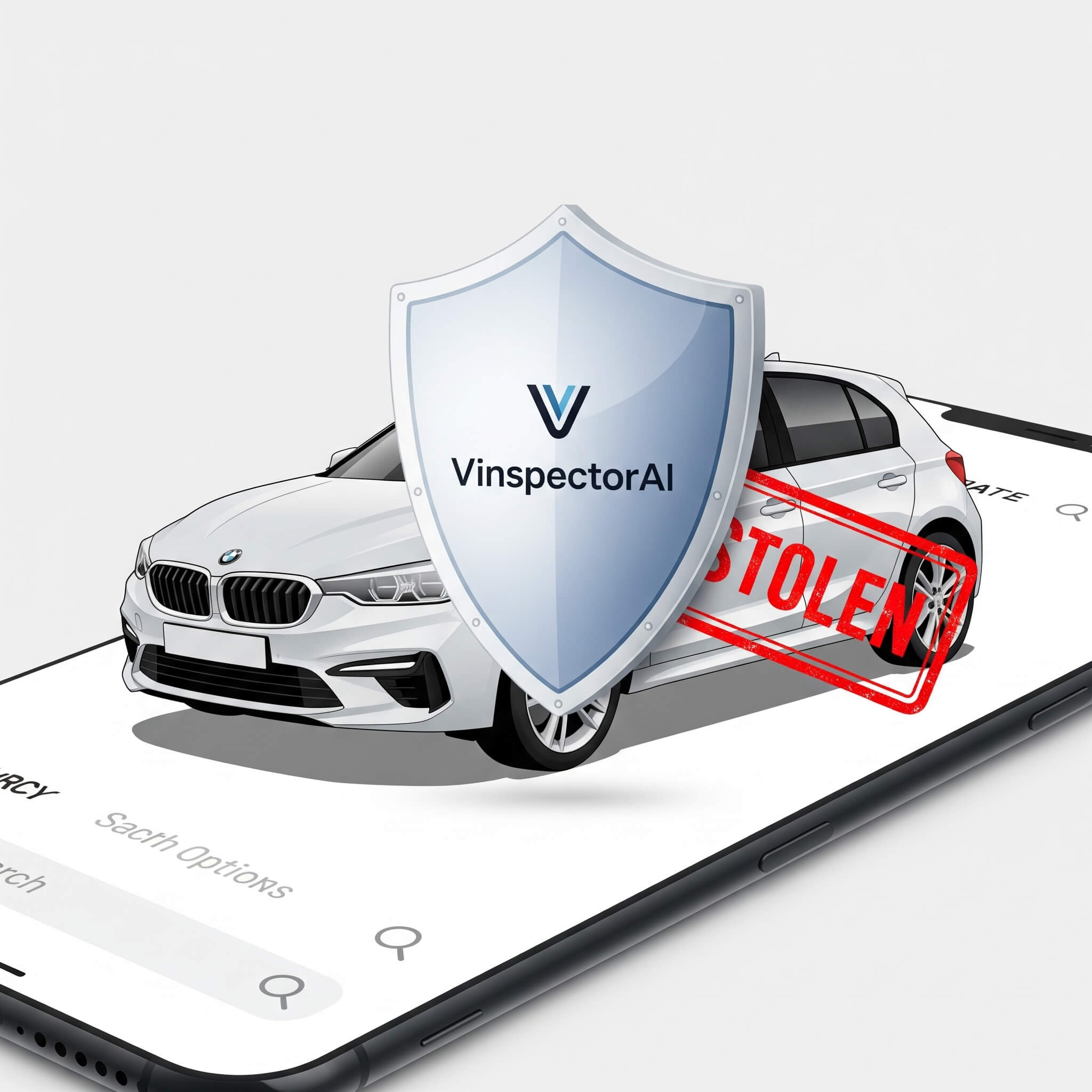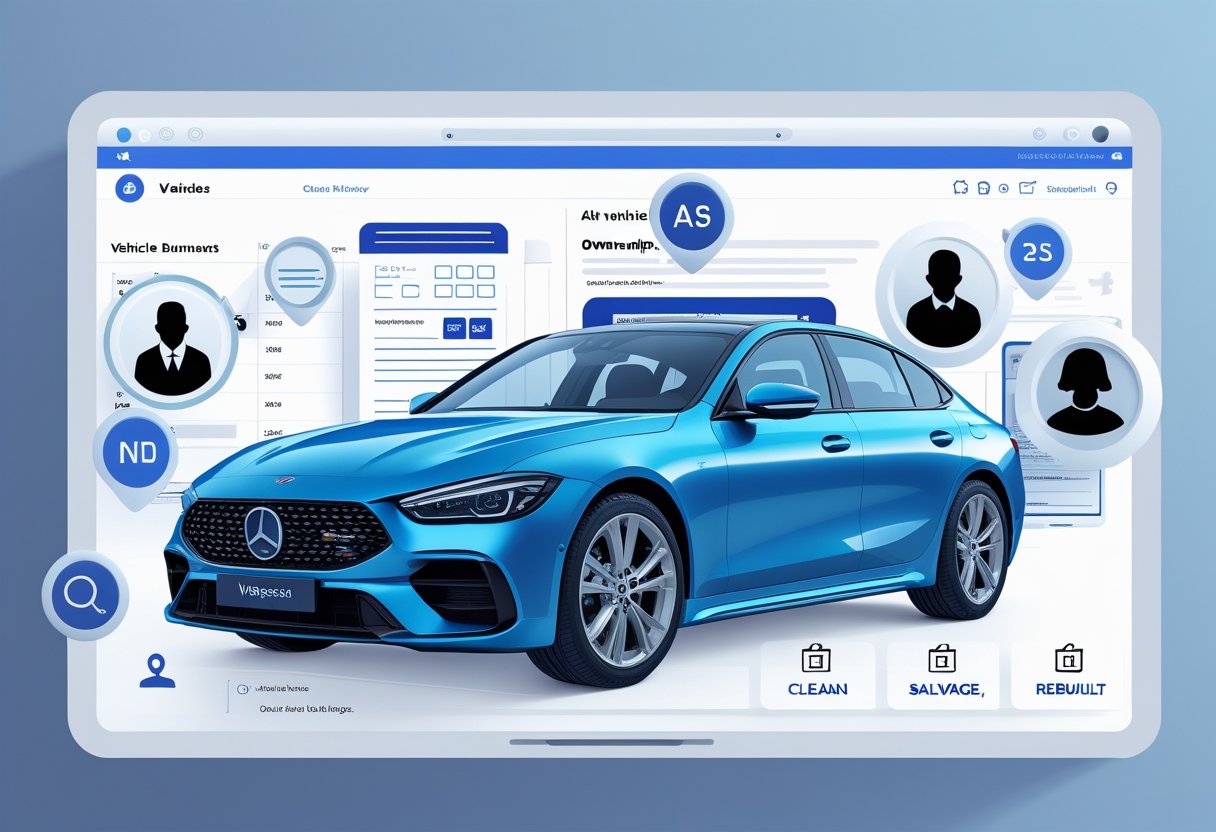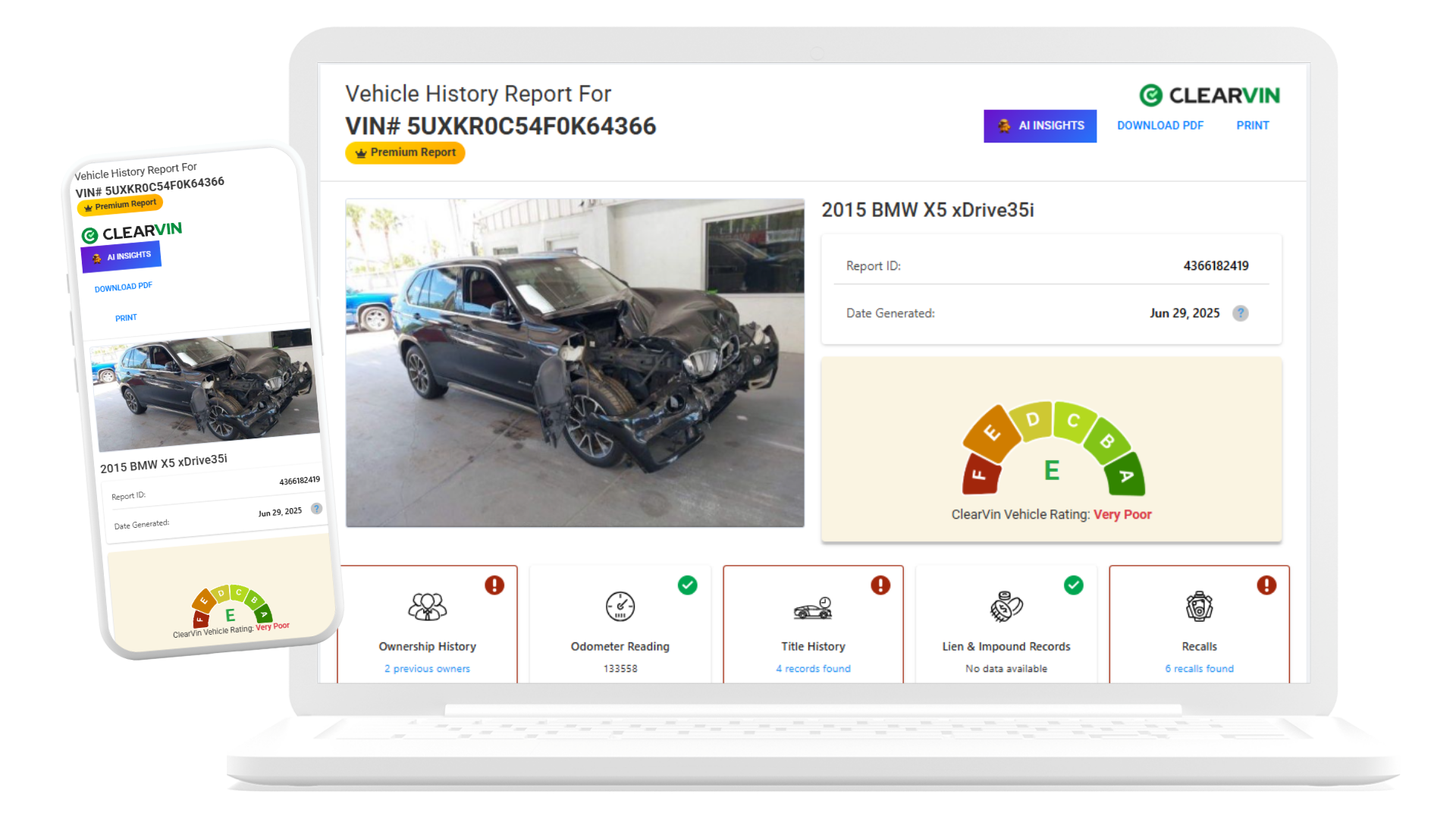
Stolen Car Check: Buy Used Cars Safely
Buying a used car offers great value, but hidden risks can put a buyer’s investment and peace of mind in jeopardy. Vehicles with a stolen history may seem like just another good deal until unexpected legal trouble or even sudden loss of the car occurs. Smart shoppers know that checking for stolen vehicles is essential to avoid costly surprises and protect themselves from hassle down the road.
Many rely on basic checks through the NICB database or ask local police for help, but these methods often fail to uncover the full story. With modern tools like VInspectorAI buyers get an in-depth vehicle history—covering everything from stolen status and accident history to hidden title issues—in a single, easy-to-read report. This approach streamlines the buying process and offers clear, trustworthy information that every car buyer needs.
Why Checking for Stolen Vehicles Matters
Verifying a vehicle’s history helps avoid major legal, financial, and personal problems. Stolen cars can put buyers at risk of confiscation, lawsuits, and significant financial loss.
Risks of Buying a Stolen Car
Anyone who unknowingly purchases a stolen vehicle may still lose the car without compensation. Authorities have the legal right to seize stolen vehicles, leaving buyers with nothing to show for their investment.
Stolen cars sometimes have altered documentation or VIN numbers. This can lead to difficulties with registration or making insurance claims. Issues can also arise years later, even if the car’s stolen status goes undetected at purchase.
Buyers may face difficulties selling a car flagged as stolen in the future. It can make ownership uncertain and complicate any attempt to recover costs through resale.
Legal Consequences for Buyers
Even if a buyer has no involvement in the theft, the law may still hold them responsible for possessing stolen property. This can result in the vehicle being confiscated and, in rare cases, legal proceedings against the buyer.
Possession of stolen property creates a record that may affect future transactions and interactions with law enforcement. Investigations can be time-consuming and stressful for both the buyer and their family.
Buyers may become entangled in disputes with previous owners or insurance companies. These legal conflicts can take months or even years to resolve, adding stress to the vehicle ownership experience.
Financial Impact of a Bad Purchase
Losing a car to a theft recovery can mean the complete loss of all money paid—there is rarely any reimbursement. Banks and lenders will often still require payment, even if the car is confiscated.
Additional expenses may arise from legal fees, registration problems, or increased insurance premiums. A buyer’s credit may also be impacted if a loan remains unpaid due to the seizure of the vehicle.
Costly repairs had already been made may not be refunded. There are also the indirect costs of finding a new vehicle, missed work, or lost time getting back on the road.
Traditional Methods for Identifying Stolen Cars
Government resources and police agencies provide established ways to verify if a used vehicle has been reported stolen. Buyers can use trusted databases and contact local authorities to investigate a car’s history before making a purchase.
Using NICB VINCheck
The National Insurance Crime Bureau (NICB) offers a free service called VINCheck. Buyers can enter a vehicle’s 17-digit VIN on the NICB website to see if it has been reported as stolen or declared a salvage vehicle by a participating insurance company.
This check is fast and accessible, requiring only the VIN and an internet connection. However, it relies on data reported to insurance companies, so record coverage may not be complete. The service does not provide details like accident history or prior ownership.
NICB VINCheck is ideal for a quick initial check, but it should be considered one part of a broader research process. Always cross-reference the results with other records for a fuller picture.
Contacting Local Law Enforcement
Buyers can contact their local police department to inquire about a specific vehicle’s status. Law enforcement agencies have access to national and state databases, offering information not always available through public VIN checks.
Before requesting a check, be prepared to provide the full VIN and any supporting documents. Police may ask for identification or ownership documentation to process the request.
This method can take more time than online tools, and response procedures may vary by jurisdiction. While not always instant, involving law enforcement is a reliable way to detect whether a car has been flagged as stolen in official records.
The VInspectorAI Advantage: Comprehensive VIN Checks
VInspectorAI offers a structured, fact-based approach to used car history checks. Buyers receive an organized VIN report containing critical data to support informed and secure vehicle purchases.
Instant Stolen Vehicle Alerts
VInspectorAI immediately flags if a vehicle is reported stolen anywhere in the U.S. This check pulls from law enforcement and national stolen vehicle databases, presenting the latest information available.
An alert clearly appears at the top of each report if there is a stolen status match. This enables buyers to avoid vehicles that may be subject to legal recovery or confiscation.
Buyers no longer need to search multiple websites or contact agencies VInspectorAI automatically scans for stolen vehicle records and displays results without delay. This saves valuable time and reduces uncertainty in the buying process.
Title Issues and Salvage History
The platform checks for all types of title problems, including salvage, rebuilt, or flood titles. It lists the title status from every state where the car has been registered, highlighting concerns like odometer rollbacks or undisclosed liens.
Detailed Accident and Service Records
VInspectorAI includes a timeline of accidents, damage incidents, and service history based on data from insurance companies, repair shops, and national reporting services. Each reported accident includes dates, severity, and locations, helping buyers assess the car’s true condition.
Service and maintenance records show recurring mechanical problems or gaps in care. These details make it easier to estimate potential future costs and ensure no major repairs are being hidden.
By offering both accident and service data, VInspectorAI helps buyers distinguish well-maintained vehicles from those with serious hidden damage.
User-Friendly Reports for Peace of Mind
Every report is organized for clarity—main findings are summarized at the beginning, and additional details are broken out into easy-to-read sections. Icons and bold highlights bring attention to any critical issues, making technical terms understandable even for first-time buyers.
Key features include:
- Simple pass/fail warnings for theft, title, and accident risk
- Visual summaries (graphs, tables) for fast scanning
- Plain-language explanations for each red flag
This level of organization allows users to make confident purchase decisions without needing advanced vehicle knowledge.
Physical Inspection Tips for Detecting Red Flags
Thorough physical checks can reveal warning signs of vehicle tampering or past theft. Buyers should scrutinize areas of the car where stolen vehicles are often altered or disguised.
Checking for VIN Tampering
Every vehicle contains multiple VIN (Vehicle Identification Number) placements, such as on the dashboard, driver’s side door, and engine block. Each VIN location should match exactly; even minor differences can indicate tampering.
What to look for:
- Mismatched VINs between different parts of the car
- Scratched, abraded, or re-stamped plates
- Unusual rivets, crooked or loosely attached tags
- Paint residue or signs of sticker removal/reattachment
Buyers should use a flashlight to check for uneven surfaces or tool marks around the VIN plate. Authentic VIN plates are factory-installed and should appear clean, straight, and permanently affixed.
Signs of Ignition or Lock Damage
A common indicator of theft is damage to the ignition or door locks. Thieves may force or bypass locks, leaving behind obvious evidence.
Signs include:
- Scratches or gouges around the keyhole
- Loose, wobbly, or missing ignition components
- Key not matching door or trunk locks
- Ignition switch that looks recently replaced or doesn’t match the rest of the dash
It is important to test all keys and locks, ensuring that one set operates all doors, the ignition, and the trunk. Any irregularities should be considered a possible warning sign.
Verifying Ownership Documents
Documentation inconsistencies are a major red flag. Buyers should carefully review the title, registration, and bill of sale for errors, discrepancies, or missing information.
Key points to verify:
- Names on all documents match the seller’s ID
- VIN on paperwork matches every VIN on the vehicle
- Title status shows “clear” and not “salvage” or “rebuilt” unless disclosed
- Legible, official stamps and seals
Request original documents rather than copies. Any hesitation from the seller to provide paperwork or answers can indicate hidden issues with the vehicle’s history.
Conclusion and Next Steps
Choosing a used car requires careful research to avoid unexpected legal and financial problems. Comprehensive checks and physical inspections enable buyers to identify potential risks and make informed decisions.
Ensuring a Safe Used Car Purchase
A safe used car purchase begins with more than just looking at the exterior or taking a short test drive. Buyers should prioritize verifying the car’s history, including its stolen status and previous incidents, to avoid serious complications. Failing to confirm these factors can result in the loss of both money and the vehicle, as stolen cars are often reclaimed by authorities.
Key steps buyers should take:
- Review the car’s history using a trusted VIN checker.
- Inspect for physical signs of tampering, like mismatched VIN plates or damaged ignition parts.
- Ensure all documentation is present, such as a title and registration that match the vehicle’s details.
Being thorough when evaluating both paperwork and the car itself greatly reduces the risk of purchasing a problematic vehicle.
Call to Action: Protect Your Investment with VInspectorAI
Reliable tools are essential for a clear and accurate picture of a used car’s background. VInspectorAI stands out by combining data sources to check for stolen status, title issues, accident history, and more, all in an easy-to-read report. This process gives buyers concrete information before committing to a purchase.
VInspectorAI streamlines VIN checks so users can act quickly, reducing stress and uncertainty. Investing a small amount of time upfront with a trusted history report can prevent major issues down the road.
Don't take chances with your next used car. Get the full history and ensure peace of mind. Visit VInspectorAI today to run a comprehensive VIN check and protect your investment!
Uncover Complete Vehicle History Reports
Discover critical vehicle information before you buy. Our VIN decoder reveals accident records, title status, recalls, and service history to help you make informed decisions.
Related Articles
Explore Tags
More from Automotive Technology

Get a 100% free auto history check with VinspectorAI. No hidden fees. Uncover accidents, ownership, theft & more. Test our full AI analysis with a free demo!
Transparent VIN checks build trust in auto sales. Give buyers clear vehicle history reports & integrate checks for confident, informed car purchases.

VINspectorAI uses AI to uncover accidents, fraud, recalls & true value — ensuring safe, smart purchases. Why You Should Check a Car’s, check now with vinspectorai.
